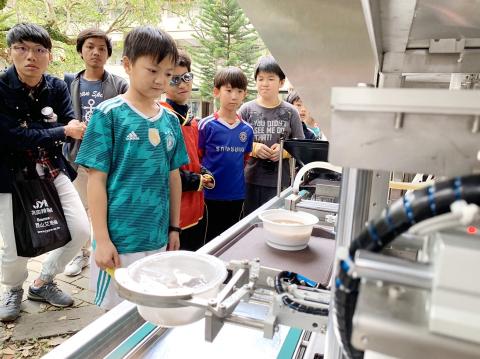The invention of a machine that can automatically cook beef noodle soup in one minute could help promote Chinese cuisine around the globe, National Taiwan University of Science and Technology professor Lin Chi-yu (林其禹) said on Tuesday.
He has devoted a lot of time to researching smart machinery and robots, and the idea for the automated cooking machine surfaced when he had a craving for Chinese cuisine while traveling, Lin said.
The machine was developed with the help of his student Wu Jui-teng (吳睿騰), who is pursuing a master’s degree at the university, Lin said.

Photo courtesy of National Taiwan University of Science and Technology
The processes of providing food containers, cooking noodles, ladling soup, adding soup and providing appetizers are all automated and would not need manual assistance or supervision, Lin said.
However, the restocking of noodles, stock soup and other ingredients would still have to be handled by someone, Lin added.
Customers would be able to customize their orders, ranging from how long they want their meal cooked to what kind of noodles they want, Lin said.
Regardless of the customization settings, the machine would only require one minute to produce the food from the time the order is placed, Lin said.
As there are no similar products on the market, they had to come up with the design, materials and components by themselves, Wu said.
Every redesign taught them something new and brought them closer to creating the ideal machine, Wu said.
During the design process, he learned new skills, such as mechanical design and how to use software to generate design blueprints, Wu said.
“The current price tag for the machine stands at NT$1 million [US$32,461], but we expect that buyers would be able to break even within two years,” Lin said.

Trips for more than 100,000 international and domestic air travelers could be disrupted as China launches a military exercise around Taiwan today, Taiwan’s Civil Aviation Administration (CAA) said yesterday. The exercise could affect nearly 900 flights scheduled to enter the Taipei Flight Information Region (FIR) during the exercise window, it added. A notice issued by the Chinese Civil Aviation Administration showed there would be seven temporary zones around the Taiwan Strait which would be used for live-fire exercises, lasting from 8am to 6pm today. All aircraft are prohibited from entering during exercise, it says. Taipei FIR has 14 international air routes and

Taiwan lacks effective and cost-efficient armaments to intercept rockets, making the planned “T-Dome” interception system necessary, two experts said on Tuesday. The concerns were raised after China’s military fired two waves of rockets during live-fire drills around Taiwan on Tuesday, part of two-day exercises code-named “Justice Mission 2025.” The first wave involved 17 rockets launched at 9am from Pingtan in China’s Fujian Province, according to Lieutenant General Hsieh Jih-sheng (謝日升) of the Office of the Deputy Chief of the General Staff for Intelligence at the Ministry of National Defense. Those rockets landed 70 nautical miles (129.6km) northeast of Keelung without flying over Taiwan,

The Ministry of National Defense (MND) today released images of the military tracking China’s People's Liberation Army (PLA) movements during the latest round of Chinese drills around Taiwan. The PLA began "Justice Mission 2025" drills today, carrying out live-fire drills, simulated strikes on land and maritime targets, and exercises to blockade the nation's main ports. The exercises are to continue tomorrow, with the PLA announcing sea and air space restrictions for five zones around Taiwan for 10 hours starting from 8:30am. The ministry today released images showing a Chinese J-16 fighter jet tracked by a F-16V Block 20 jet and the

City buses in Taipei and New Taipei City, as well as the Taipei MRT, would on Saturday begin accepting QR code payments from five electronic payment providers, the Taipei Department of Transportation said yesterday. The new option would allow passengers to use the “transportation QR code” feature from EasyWallet, iPass Money, iCash Pay, Jkopay or PXPay Plus. Passengers should open their preferred electronic payment app, select the “transportation code” — not the regular payment code — unlock it, and scan the code at ticket readers or gates, General Planning Division Director-General Liu Kuo-chu (劉國著) said. People should move through the